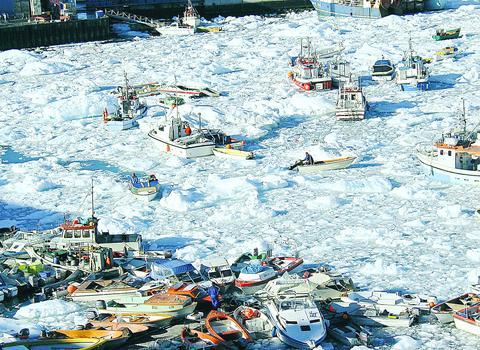Residents of Ilulissat, the town on Greenland's western coast famed for the majestic icebergs that glide through its fjord nearly choked on their morning coffee as they read the news: the town's biggest attraction was melting away.
The Groenlands Posten newspaper sent locals into a tizzy when it a few weeks ago described how the Sermeq Kujalleq glacier, one of the most active glaciers in the world, had receded by more than 5km in the past two years.

PHOTO: AFP
"There is a risk that the glacier will stop calving into the icefjord," it said, using the term which normally describes a cow giving birth but is also used by scientists to describe how a piece of a glacier breaks off and forms an iceberg.
The news came just two months after UNESCO placed the Ilulissat Icefjord on the World Heritage List.
"The combination of a huge ice-sheet and the dramatic sounds of a fast-moving glacial ice-stream calving into a fjord covered by icebergs makes for a dramatic and awe-inspiring natural phenomenon," the UN's cultural body said.
Located 250km north of the Arctic Circle, Ilulissat is home to 5,000 people, most of whom live off shrimp and halibut fishing as well as the all-important tourism industry.
Some 15,000 tourists visit the town each year, or about half of all those who visit Greenland. In addition, 235 luxury cruiseboats laden with tourists docked on the island this summer, carrying thou-sands of people keen to experience the dramatic sights and sounds of the moving ice.
"I hope this isn't true, that the glacier is not sleeping. ... The tourists come here just to see the magic spectacle of the icebergs," says Anton, who works at a local hotel.
Glacier experts were able to ease islanders' fears somewhat. They said that despite fears of dramatic climate change due to global warming, it was unlikely that Ilulissat would become a "quiet" glacier, behaving like most of the others in the world.
"The glacier has receded a lot since 2002, which is very surprising and new since it had been relatively stable, almost unchanged since the 1950s," glacier expert Henrik Hoejmark Thomsen of the Geological Survey of Denmark and Greenland said.
Satellite photos taken last year showed that the glacier had regressed by 5km to 7km, a shrinkage which has continued according to observations made by hunters and helicopters pilots who have flown over the region recently.
"However, there is no danger that the glacier will stop producing iceslides, even if it recedes, Thomsen said.
"The regression and expansion of the glacier is not an exceptional phenomenon. In 1860, it reached the middle of the Ilulissat Icefjord, and 5,000 years before that it had receded by 20km," he said.
In the meantime, tourist boats will continue to sail through the fjord, maneuvering carefully between the icebergs.
On this day, a few awestruck tourists ask the captain to steer their boat closer to an iceberg, only to hear his ominous warning: "The icebergs may look calm, but they can crack suddenly and create huge waves, and you won't have a chance.
"Remember the Titanic," he said.

Malaysia yesterday installed a motorcycle-riding billionaire sultan as its new king in lavish ceremonies for a post seen as a ballast in times of political crises. The coronation ceremony for Malaysia’s King Sultan Ibrahim, 65, at the National Palace in Kuala Lumpur followed his oath-taking in January as the country’s 17th monarch. Malaysia is a constitutional monarchy, with a unique arrangement that sees the throne change hands every five years between the rulers of nine Malaysian states headed by centuries-old Islamic royalty. While chiefly ceremonial, the position of king has in the past few years played an increasingly important role. Royal intervention was

X-37B COMPARISON: China’s spaceplane is most likely testing technology, much like US’ vehicle, said Victoria Samson, an official at the Secure World Foundation China’s shadowy, uncrewed reusable spacecraft, which launches atop a rocket booster and lands at a secretive military airfield, is most likely testing technology, but could also be used for manipulating or retrieving satellites, experts said. The spacecraft, on its third mission, was last month observed releasing an object, moving several kilometers away and then maneuvering back to within a few hundred meters of it. “It’s obvious that it has a military application, including, for example, closely inspecting objects of the enemy or disabling them, but it also has non-military applications,” said Marco Langbroek, a lecturer in optical space situational awareness at Delft

The Philippine Air Force must ramp up pilot training if it is to buy 20 or more multirole fighter jets as it modernizes and expands joint operations with its navy, a commander said yesterday. A day earlier US National Security Adviser Jake Sullivan said that the US “will do what is necessary” to see that the Philippines is able to resupply a ship on the Second Thomas Shoal (Renai Shoal, 仁愛暗沙) that Manila uses to reinforce its claims to the atoll. Sullivan said the US would prefer that the Philippines conducts the resupplies of the small crew on the warship Sierra Madre,

AIRLINES RECOVERING: Two-thirds of the flights canceled on Saturday due to the faulty CrowdStrike update that hit 8.5 million devices worldwide occurred in the US As the world continues to recover from massive business and travel disruptions caused by a faulty software update from cybersecurity firm CrowdStrike, malicious actors are trying to exploit the situation for their own gain. Government cybersecurity agencies across the globe and CrowdStrike CEO George Kurtz are warning businesses and individuals around the world about new phishing schemes that involve malicious actors posing as CrowdStrike employees or other tech specialists offering to assist those recovering from the outage. “We know that adversaries and bad actors will try to exploit events like this,” Kurtz said in a statement. “I encourage everyone to remain vigilant